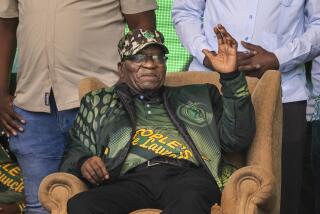Judge Upholds Ban on Winnie Mandela; Message From Reagan Is Given to Botha
- Share via
JOHANNESBURG, South Africa — A justice of the South African Supreme Court on Monday upheld a government order that bars black nationalist Winnie Mandela from living in her Soweto home outside Johannesburg and prohibits her from taking part in any political activity.
Justice L.J. le Grange sidestepped the major legal issues raised in Mandela’s lawsuit objecting to the Dec. 21 order evicting her from her home and instead passed the case to the full tribunal by giving her permission to appeal his decision, acknowledging that “the personal freedom of an individual is an important principle.”
The decision raises the political question of what tactics Mandela, wife of imprisoned African National Congress patriarch Nelson Mandela, will adopt next in her challenge to the white minority government of President Pieter W. Botha.
Soweto Return Unlikely
She has tentatively ruled out a defiant return to Soweto--she was arrested twice for doing so and could be jailed for up to six years if convicted of these violations of her “banning” order. But according to friends, she is considering other ways to flout the government’s authority.
In Cape Town, meanwhile, Chester A. Crocker, U.S. assistant secretary of state for African affairs, gave Botha a letter from President Reagan on the situation in South Africa and the southern African region as a whole, in what many diplomats took as the final U.S. attempt to salvage the Reagan Administration’s policy of “constructive engagement” with the white regime.
Neither American nor South African spokesmen would disclose the letter’s contents or details of Crocker’s talks with Botha and later with Foreign Minister Roelof F. (Pik) Botha and other senior officials.
But the unusual personal message from Reagan and the length of Crocker’s meetings--nearly two hours with the president instead of the planned 30 minutes, and five hours more with the foreign minister and other officials--suggested an intensive U.S. effort to move forward on major issues.
One of Crocker’s goals, according to diplomats in Cape Town, is to impress on Botha the urgent need--if South African-U.S. relations are not to deteriorate further--for a broad and credible package of reforms that would begin the dismantling of apartheid.
The other American priority, the diplomats believe, is a breakthrough in the long stalemate over independence for Namibia (South-West Africa), which the Pretoria authorities continue to administer in defiance of U.N. resolutions calling for withdrawal.
Crocker visited Angola last week to discuss the key issue delaying resolution of the Namibian question, the withdrawal of thousands of Cuban troops from Angola. He is seeking formal Angolan and South African responses to U.S. proposals on the issue made last March.
Meanwhile, four more blacks were killed Monday in the unremitting unrest that began 17 months ago. Three were shot by a black policeman defending his home in Stutterheim, a troubled community in eastern Cape province, from a mob of more than 1,000 trying to burn him out.
In the nominally independent tribal homeland of Bophuthatswana, northwest of Johannesburg, police clashed with several hundred blacks at Mabopane, the scene of growing unrest over the last week. A police patrol opened fire on the crowd to disperse it after being surrounded, killing one person and injuring a number of others. The police said they eventually arrested about 150 people in the incident, which began when they tried to stop a group from collecting funds for the funeral of a victim of earlier unrest.
In ruling against Mandela, Le Grange effectively upheld the government’s powers to impose whatever restrictions on her that it feels are required under the country’s severe security laws. Those laws permit internal exile, without trial, of opposition leaders and the silencing of critics by prohibiting such activities as family gatherings, birthday parties, weddings and funerals.
1983 Order Valid
Le Grange ruled that a June, 1983, government order banishing Mandela to the remote town of Brandfort, in the Orange Free State, was valid under the security laws, as was the December order amending it. That order relaxed the earlier restrictions so she could leave Brandfort but still not enter the Johannesburg or Roodeport magisterial districts and thus come to Soweto.
Mandela’s attorney, Sydney W. Kentridge, argued that the earlier order had lapsed because it was no longer enforced and that the new order was invalid because the government provided no reason or opportunity to challenge it. He argued that her eviction from her Soweto home was “grossly inhuman” and thus contrary to South African law.
Mandela was not in court Monday and has been staying for the last two weeks at hotels outside the Johannesburg and Roodeport districts from which she is barred.
Ismail Ayob, another of her attorneys, said the ruling will be appealed. Mandela’s trial, scheduled for Jan. 22 on charges of violating the ban by returning to Soweto, will be postponed until the appeal is heard.
More to Read
Sign up for Essential California
The most important California stories and recommendations in your inbox every morning.
You may occasionally receive promotional content from the Los Angeles Times.













